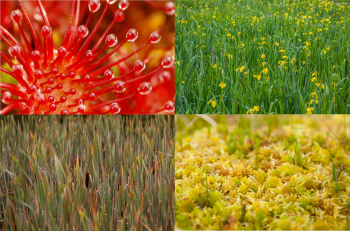News
2022
Paludiculture: How to and with what plants?
by Roxane Bradaczek (comments: 0)
Two new GMC publications show it

20/12/2022 You happen to have a peatland where you want to implement paludiculture, but don't know how? Convert an entire farm to "wet" agriculture - how can that be done? Or - you might be looking for the biomass from wet land for new products? For questions like these, the new Guide to Implementing Paludiculture (German only) within the GMC proceedings offers information. It aims at land managers, landowners, project sponsors, water and soil associations, government agencies, agricultural advisors, research institutions, and potential utilization companies. The guide covers five areas: Site suitability, planning and permitting for conversting sites to paludiculture, practical tips for establishment and management of sites, as well as utilisation of the biomass produced and support - including examples of implementation.
The publication Potential Paludiculture Plants of the Holarctic (English only) presents which plants are suitable for paludiculture in the Holarctic. In 440 pages, There are profiles of 95 plant species from the Database of Potential Paludiculture Plants (DPPP). Most are promising for sustainable wet land use on peatlands. Some might be considered critically since the paludiculture potential finds its limits, for example, in terms of new peat formation. In the plant portraits, comprehensive information has been compiled on the characterisation of the species, site requirements, cultivation as well as possible uses of the plant.
Source: Greifswald Mire Center
Why peatlands matter in 74 min and 4 chapters
by Roxane Bradaczek (comments: 0)
New: Online course by ZEITAkademie and GMC
8/12/2022 Peatlands as a multi-talent for climate, humans and nature – that seemed a sufficiently “burning” topic to ZEIT Akademie. In cooperation with the Greifswald Mire Centre th education provider produced an online course Peatlands as environmental protectors. It has four chapters and 74 minutes. Starring: Prof. Hans Joosten, scientist and one of the GMC’s founders, who has been awarded the German Environmental Prize in 2021 and the Federal Cross of Merit in 2022. He explains the basics on peatlands. Dr. Franziska Tanneberger describes why drained peatlands harm the climate and why we need peatland protection. The studied landscape ecologist and one of the two directors of the GMC is always in action for peatlands -from field work to world climate summits. Henning Voigt, an agricultural pioneer on peatland, takes the participants with him on his rewetted areas and tinkerer Torsten Galke invites to visit in the Paludiculture Tiny House. Dr. Johannes Merck of Michael Otto Environmental Foundation reports that even large companies do trecognise the economic potential in peatlands today. To develop a climate-friendly use of wet and rewetted areasareas is part of the toMOORow initiative, which promotes peatland rewetting as a nature-based solution to the climate crisis and species extinction, as well as an example of sustainable regional creation of added value through paludiculture.
According to its own information, ZEIT Akademie works with the best experts in their respective fields, such as the climate scientist Prof. Stefan Rahmstorf. An important argument for the two GMC scientists. "For today's challenges, science must not remain in the ivory tower. We want to teach peatlands in a non-university context as well." says Franziska Tanneberger "Of course, the quality must not be lost in and the subject must not suffer due to severe briefness. In this course, that can be combined." Another consideration: The ZEITAkademie's offerings are aimed at private individuals, but primarily at companies for in-house training. A good opportunity to foster a change in a wider public perception of peatlands - because peatlands are not scary, but incredibly important - for all of us.
Source: Greifswald Mire Center
Peatland protection strategy
by Roxane Bradaczek (comments: 0)
09.11.2022 The Federal Government has adopted the Peatland Protection Strategy. The Succow Foundation is very pleased about this. In order for the strategy to be effective, we would like to focus on a few more details.
Germany has a peatland protection strategy - and it is supported by the entire federal government! With today's cabinet decision, the federal government is implementing one of its announcements in the coalition agreement. Although the new strategy differs only in nuances from the paper already adopted by the Federal Ministry for the Environment in 2021, it now commits the entire government with all departments to give greater consideration to peatlands in political decision-making. This clear commitment to implement peatland protection not as a niche task but as a mainstream in all business areas of the federal government, in procurement and on federally owned land as a model is very welcome by the Succow Foundation, partner in the Greifswald Moor Centrum. In addition, the Natural Climate Protection Action Programme, which was already adopted in the summer, finally provides an appropriately equipped framework for implementation. However, in order to achieve the great peatland transformation as a process involving society as a whole, it is important to reduce bureaucracy and speed up planning and approval procedures. In addition to adjustments in planning law, this also requires additional capacities at all levels, which can only be built up in the medium term through educational offers at schools, universities and training centres. The Succow Foundation is already supporting this process with the MoKKa project. Our comments on the peatland protection strategy in detail can be found in today's media information.
Source: Michael Succow Foundation
Containing plenty of peatlands, but there's room for more
by Roxane Bradaczek (comments: 0)
Action Programme Natural Climate Protection
28/10/2022 Peatland protection as a nature-based solution for effective climate protection is extensively considered in the Action Programme Natural Climate Protection (ANK), states the Greifswald Moor Centrum in its statement in the BMUV's online dialogue on this programme, which ends today. But there is still some room for improvement. Here is a summary of the most important points:
The target of 5 million t CO2 eq. annual reduction from peatlands by 2030, which is also set in the Peatland Protection Strategy, is still low. This is less than 10% of the current annual peatland emissions of 53 million t CO2.
The framing should change. Germany's peatlands are currently predominantly (85%) used for agriculture or forestry. The term "renaturation" suggests a natural development uninfluenced by humans after rewetting and the possibility of returning the peatlands to their former condition. In Germany, neither of these is possible in most cases. Therefore, the terms "rewetting" and "restoration" are more appropriate. These formulations express that the ANK also includes new, sustainable uses for peatlands.
The ANK can educate more people about peatlands and build long-term structures at federal, state and local levels. In addition to voluntary measures, it should also make adjustments to planning and regulatory law, thus enabling linked work by participating authorities for a comprehensive landscape assessment.
Source: Greifswald Mire Centre
Duly awarded!
by Sabrina Hüpperling (comments: 0)
Federal Order of Merit for Hans Joosten

27/9/2022 Professor Hans Joosten from Greifswald will receive the Order of Merit of the Federal Republic of Germany on 30th September for his research on and his personal commitment to peatlands and climate protection. Matching the slogan "Building Bridges", Federal President Frank-Walter Steinmeier will honour the peatland scientist and further 20 persons on the occasion of the Day of German Unity at Bellevue Palace which is celebrated on the 3rd October. According to the Office of the Federal President, the eleven women and ten men are making an outstanding contribution to finding solutions to the global challenges of our time, such as the war against Ukraine, the Corona pandemic, poverty reduction, migration and climate change, as well as to strengthening cohesion in our country.
Regarding the award for the native Dutchman, it says: "Thanks to Hans Joosten, it is known today: drained peatlands are climate killers, "rewetted" ones are climate savers. The biologist is a pioneer in the search for ways to protect the climate. At the University of Greifswald, he co-founded the Greifswald Mire Centre, one of the world's most sought-after research centres for climate protection. However, Hans Joosten has not left it at scientific research on the relevance of peatlands for the climate. He has shown practical ways to use the areas for agriculture again and in the process coined a whole new discipline, "paludiculture". Beyond his scientific work, he has always been involved in political debates, because climate protection needs everyone's action."
Frank-Walter Steinmeier and Joosten had already met last year at an award ceremony. The Federal President had presented the scientist with the German Environmental Award 2021 of the Deutsche Bundesstiftung Umwelt (DBU).
Source: Greifswald Mire Centre











